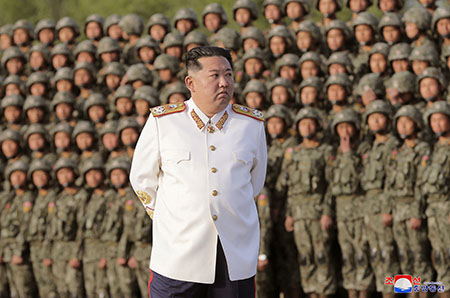Special to WorldTribune.com
 Commentary by John J. Metzler
Commentary by John J. Metzler
North Korea’s petulant and isolated regime wants attention. It’s thirty-something Dictator Kim Jong-Un vies for the noxious notoriety which much of the world has focused on Vladimir Putin’s war in Ukraine or Xi Jinping’s military threats to Taiwan.
Poor Kim had his fire and fury moment back in 2017 until he was put back in his box by the Trump Administration.
So, Kim Jong-Un and his family sit, stew and plot in the quaintly titled Democratic People’s Republic of Korea (DPRK) waiting for their moment when global attention and concerns once again turn to the divided Korean peninsula and the implications of a nuclear armed North Korea.

Confrontation cycles are as predictable as weather patterns. During Kim Jong-Un showdowns in March 2013, the winds of war returned to the Korean Peninsula and to the shores of Japan and Hawaii as the then newly-installed North Korean leader brought a renewed level of both military and rhetorical volatility to the region.
Then in 2017 Kim tested the new American Administration with a spate of missile firings and rounds of incendiary rhetoric. President Donald Trump pushed back with firmness and rhetorical salvos of his own warning Kim Jong-Un that his actions are courting “fire and fury.”
Not only did the North Koreans back down but later engaged in unprecedented diplomacy which led to the historic Singapore Summit in June 2018 and, an unofficial three-year moratorium on missile launches.
This year the UN Security Council has met many times in response North Korea’s actions.
U.S. Amb. Linda Thomas-Greenfield warned a recent Council briefing, “This is the DPRK’s eighth ICBM launch this year, part of an unprecedented 63 ballistic missiles in 2022.”
She warned, “Sixty-three times this year the DPRK has flagrantly violated Security Council resolutions and attempted to undermine global nonproliferation.”
Firing of the intercontinental ballistic missile Hwasong 17 over Japan has been hailed by the North Koreans as “the world’s strongest strategic weapon.” Despite the hyperbolic propaganda from Pyongyang’s minions, there’s no doubt that the powerful rocket poses a clear and present danger not only to Japan, but to American bases in Okinawa, Guam and indeed Hawaii and beyond.
At the recent G-7 economic meeting in Bali, Indonesia, the Foreign Ministers from the seven nations said that repeated missiles launched by North Korea “further destabilizes the region.” The Summit members slammed the recent missile launches as “reckless.”
Kim Jong-Un told his state-run media that the regime’s “ultimate goal is to possess the world’s most powerful strategic force, an absolute force unprecedented in the century.”
Talk about illusions of grandeur!
Tough sets of UN sanctions followed earlier North Korean missile and nuclear tests; But agreement in the Security Council came amid a degree of cautious cooperation between the Western countries such as Britain, France and the United States alongside China and Russia until 2011.
But during the past decade, Council unity is long lost given the polarizing Syrian conflict; now there’s a logjam among the members to cooperate on matters of international peace and security when those agreements touch on the interests of Beijing and Moscow. Thus, deadlock now extends to the long-standing question of the DPRK’s nuclear proliferation.
Since 2006, the UN Security Council has passed a dozen resolutions on North Korea for its nuclear and missile proliferation. The reclusive communist regime has tested six nuclear weapons between 2006 and 2017; another nuclear test is expected.
The Kim cult and the enduring legacy of East Asia’s only Marxist Monarchy sit in judgement in their surreal capital Pyongyang.
Kim’s powerful sister Yo-Jung who serves as the primary voice of North Korea’s dialogue with the South has denounced and insulted South Korean President Yoon Suk-Yeol for planning additional sanctions on Pyongyang, calling them “idiots” and “loyal dogs” to Washington. National economic sanctions against DPRK are planned since passing a Security Council resolution becomes highly unlikely given China’s and Russia’s stance.
UN Amb. Thomas-Greenfield added significantly, “We are prepared to meet without preconditions, and I call on the DPRK to engage in serious and sustained diplomacy.” Is there still room for diplomacy given the Kim regime’s apocalyptic fantasies?
John J. Metzler is a United Nations correspondent covering diplomatic and defense issues. He is the author of Divided Dynamism the Diplomacy of Separated Nations: Germany, Korea, China (2014). [See pre-2011 Archives]
